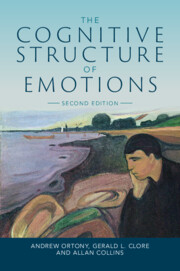Book contents
- The Cognitive Structure of Emotions
- The Cognitive Structure of Emotions
- Copyright page
- Dedication
- Contents
- Figures
- Tables
- Preface to the Second Edition
- Preface to the First Edition
- Chapter 1 Introduction
- Chapter 2 Overview of the Theory
- Chapter 3 Appraisal, the Value System, and Primary Sources of Intensity
- Chapter 4 Factors Affecting the Intensity of Emotions
- Chapter 5 Reactions to Events: I
- Chapter 6 Reactions to Events: II
- Chapter 7 Reactions to the Actions of Agents
- Chapter 8 Reactions to Objects
- Chapter 9 Formalization of the Theory and Additional Issues
- Chapter 10 There and Back Again: OCC and Affective Computing
- Appendix
- References
- Author Index
- Subject Index
Chapter 3 - Appraisal, the Value System, and Primary Sources of Intensity
Published online by Cambridge University Press: 04 August 2022
- The Cognitive Structure of Emotions
- The Cognitive Structure of Emotions
- Copyright page
- Dedication
- Contents
- Figures
- Tables
- Preface to the Second Edition
- Preface to the First Edition
- Chapter 1 Introduction
- Chapter 2 Overview of the Theory
- Chapter 3 Appraisal, the Value System, and Primary Sources of Intensity
- Chapter 4 Factors Affecting the Intensity of Emotions
- Chapter 5 Reactions to Events: I
- Chapter 6 Reactions to Events: II
- Chapter 7 Reactions to the Actions of Agents
- Chapter 8 Reactions to Objects
- Chapter 9 Formalization of the Theory and Additional Issues
- Chapter 10 There and Back Again: OCC and Affective Computing
- Appendix
- References
- Author Index
- Subject Index
Summary
The theory proposes that each of the three broad classes of emotions – Event-based emotions, Agent-based emotions, and Object-based emotions – is evaluated in terms of different criteria, that is, different kinds of knowledge representations: events are evaluated in terms of their desirability relative to goals, agents’ actions are evaluated in terms of their praiseworthiness relative to standards and norms, and objects in terms of their appeal relative to tastes. Desirability, praiseworthiness, and appeal are proposed as the primary source of intensity for the corresponding classes of emotions, while representations of goals, standards, and tastes together comprise the underlying value system. Considered in its entirety, the value system is cast as a relatively complex virtual organization of goals and their interdependencies together with a less complex arrangement of standards and tastes. It is considered to be a dynamic and virtual structure, with much of it being computed as needed. A detailed worked example is used to illustrate how, in general terms, the evaluations of events and the actions of agents might be computed.
Keywords
Information
- Type
- Chapter
- Information
- The Cognitive Structure of Emotions , pp. 49 - 70Publisher: Cambridge University PressPrint publication year: 2022
